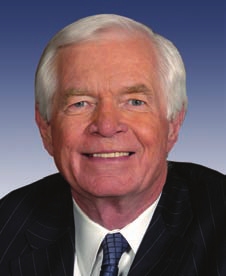
"The Senate is expected to take up a proposal, originally authored by Senator Chris Dodd (D–CT), to reform the financial regulatory system in the U.S. The goal is clear: to minimize the chances that another financial crisis—and bailouts—will arise again.
The objective is a good one. Unfortunately, the 1,408-page bill includes numerous provisions that would hurt—not help—consumers and the economy. It would even make another financial crisis or bailout more likely to occur."
That statement comes from the Heritage Foundation. They also listed fourteen flaws with the Financial Overhaul bill:
1. Creates a protected class of “too big to fail” firms. Section 113 of the bill establishes a “Financial Stability Oversight Council,” charged with identifying firms that would “pose a threat to the financial security of the United States if they encounter “material financial distress.” These firms would be subject to enhanced regulation. However, such a designation would also signal to the marketplace that these firms are too important to be allowed to fail and, perversely, allow them to take on undue risk. As American Enterprise Institute scholar Peter Wallison wrote, “Designating large non-bank financial companies as too big to fail will be like creating Fannies and Freddies in every area of the economy.”[1]
2. Provides for seizure of private property without meaningful judicial review. The bill, in Section 203(b), authorizes the Secretary of the Treasury to order the seizure of any financial firm that he finds is “in danger of default” and whose failure would have “serious adverse effects on financial stability.” This determination is subject to review in the courts only on a “substantial evidence” standard of review, meaning that the seizure must be upheld if the government produces any evidence in favor of its action. This makes reversal extremely difficult.
3. Creates permanent bailout authority. Section 204 of the bill authorizes the Federal Deposit Insurance Corporation (FDIC) to “make available … funds for the orderly liquidation of [a] covered financial institution.” Although no funds could be provided to compensate a firm’s shareholders, the firm’s other creditors would be eligible for a cash bailout. The situation is much like the scheme implemented for AIG in 2008, in which the largest beneficiaries were not stockholders but rather other creditors, such as Deutsche Bank and Goldman Sachs[2]—hardly a model to be emulated.
4. Establishes a $50 billion fund to pay for bailouts. Funding for bailouts is to come from a $50 billion “Orderly Resolution Fund” created within the U.S. Treasury in Section 210(n)(1), funded by taxes on financial firms. According to the Congressional Budget Office, the ultimate cost of bank taxes will fall on the customers, employees, and investors of each firm.[3]
5. Opens a “line of credit” to the Treasury for additional government funding. Under Section 210(n)(9), the FDIC is effectively granted a line of credit to the Treasury Department that is secured by the value of failing firms in its control, providing another taxpayer financial support.
6. Authorizes regulators to guarantee the debt of solvent banks. Bailout authority is not limited to debt of failing institutions. Under Section 1155, the FDIC is authorized to guarantee the debt of “solvent depository institutions” if regulators declare that a liquidity crisis (“event”) exists.
7. Limits financial choices of American consumers. The bill contains a new “Bureau of Consumer Financial Protection” with broad powers to limit what financial products and services can be offered to consumers. The intended purpose is to protect consumers from unfair practices. But the effect would be to reduce available choices, even in cases where a consumer fully understands and accepts the costs and risks. For many consumers, this will make credit more expensive and harder to get.[4]
8. Undermines safety and soundness regulation. The proposed Bureau of Consumer Financial Protection would nominally be part of the Federal Reserve System, but it would have substantial autonomy. Decisions of the new bureau would not be subject to approval by the Fed. New rules could be stopped only through a cumbersome, after-the-fact review process involving a council of all the major regulatory agencies. This could impede efforts of economic (or “safety and soundness”) regulators to ensure the financial stability of regulated firms, as the new, independent “consumer” regulator would establish rules that conflict with that goal.
9. Enriches trial lawyers by authorizing consumer regulators to ban arbitration agreements. Section 1028 specifically authorizes the new consumer regulatory agency to ban arbitration agreements between consumers and financial firms. By reducing the use of streamlined dispute resolution procedures, more consumers and businesses would be forced to pay the costs of litigation—to the benefit of trial lawyers.
10. Subjects firms to hundreds of varying state and local rules. Section 1044 limits pre-emption of state and local rules, subjecting banks and their customers to confusing, costly, and inconsistent red tape imposed by regulators in jurisdictions across the country.
11. Subjects non-financial firms to financial regulation. Regulation under this legislation would extend far beyond banks. Many firms largely outside the financial industry would find themselves caught in the regulatory net. Section 102(B)(ii) of the bill defines a “nonbank financial company”” as a company “substantially engaged in activities … that are financial in nature.” The phrase “financial in nature” is defined in existing law quite broadly. According to former Treasury official Gregory Zerzan, it includes things such as “holding assets of others in trust, investing in securities … or even leasing real estate and offering certain consulting services.”[5] As a result, a broad swath of private industry may find itself ensnared in the financial regulatory net. As Zerzan explains: “An airplane manufacturer that holds customer down payments for future delivery, a large home improvement chain that invests its profits as part of a plan to increase revenues, and an energy firm that makes markets in derivatives are all engaged in ‘financial activities’ and potentially subject to systemic risk regulation.”
12. Imposes one-size-fits-all reform in derivative markets. The bill would subject derivatives now traded over-the-counter by banks and other financial institutions to regulation by the Commodity Futures Trading Commission and/or the Securities and Exchange Commission (SEC). It would require most derivative contracts to be settled through a clearinghouse rather than directly between the parties. Yet derivatives are already increasingly being traded on clearinghouses thanks to private efforts coordinated by the New York Fed.[6] The Senate’s bill, however, would require virtually all derivatives to be so traded. Applying such ill-designed blanket regulation would make financial derivatives more costly, more difficult to customize, and, consequently, less widely used—which would increase overall risk in the economy.[7]
13. Allows activist groups to use the corporate governance process for issues unrelated to the corporation or its shareholders. Section 972 of the bill authorizes the SEC to require firms to allow shareholders to nominate directors in proxy statement. Such proxy access turns corporate board elections from a process designed to ensure that each board has a good mix of skills and experience into a popularity contest where the long-term interests of the stockholders become secondary to political agendas or corporate raiders. The process can also be used by labor unions, politicians who manage public pension funds, and others to force corporations to respond to pet social or political causes.
14. Does nothing to address problems at Fannie Mae and Freddie Mac. These two government-sponsored housing giants helped fuel the housing bubble. When it popped, taxpayers—because of an implicit guarantee by the U.S. Treasury—found themselves on the hook for some $125 billion in bailout money. Not only has little of this amount been paid back, but the Treasury Department recently eliminated the cap on how much more Fannie and Freddie can receive. Yet the bill does nothing to resolve the problem or reform these government-run enterprises.
Common Sense- I know that I took this information for the Heritage Foundation I figure they could explain it better than I could (even still, I don't really understand all of it and I'm sure many of you don't either). However, I do understand that this Financial Overhaul bill does not stop another economic crisis from occurring. It only pushes government further into the FREE market. It allows government to control aspect of the economy that should be left alone. It really scares me how much government is becoming involved in our lives. We need to protect our freedoms and make sure those that propose such progressive legislation never get elected again in November.



.jpg)










